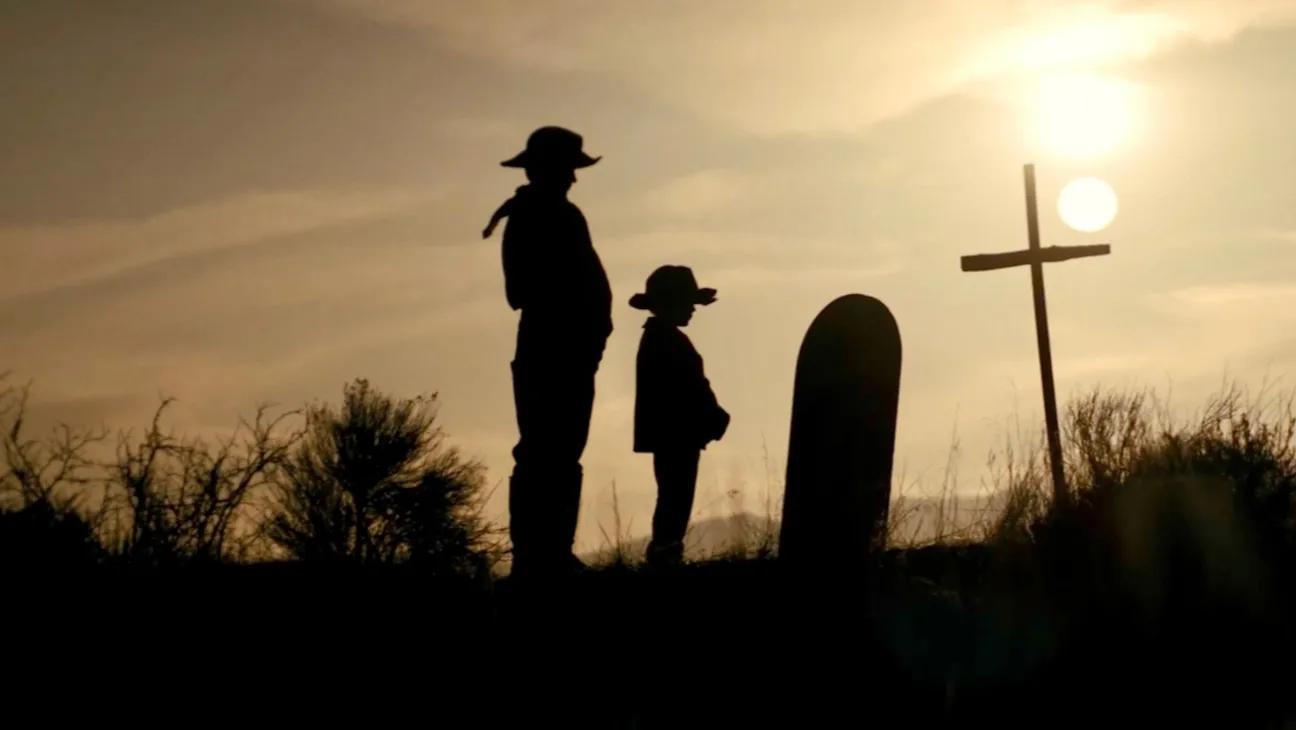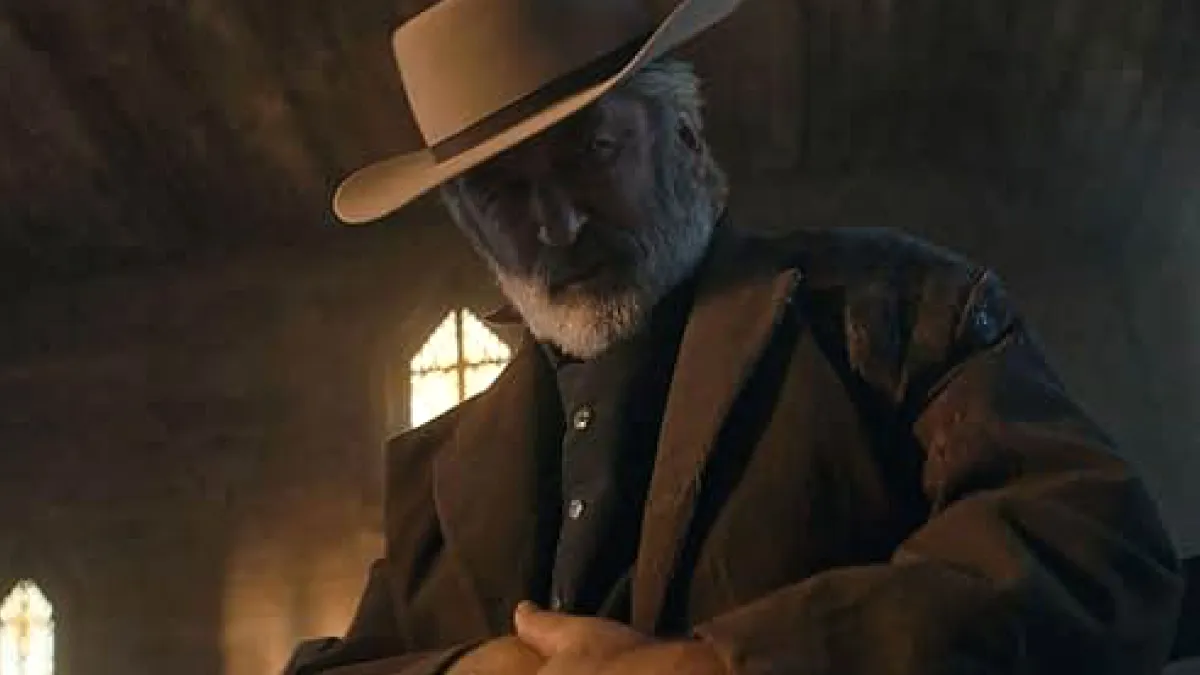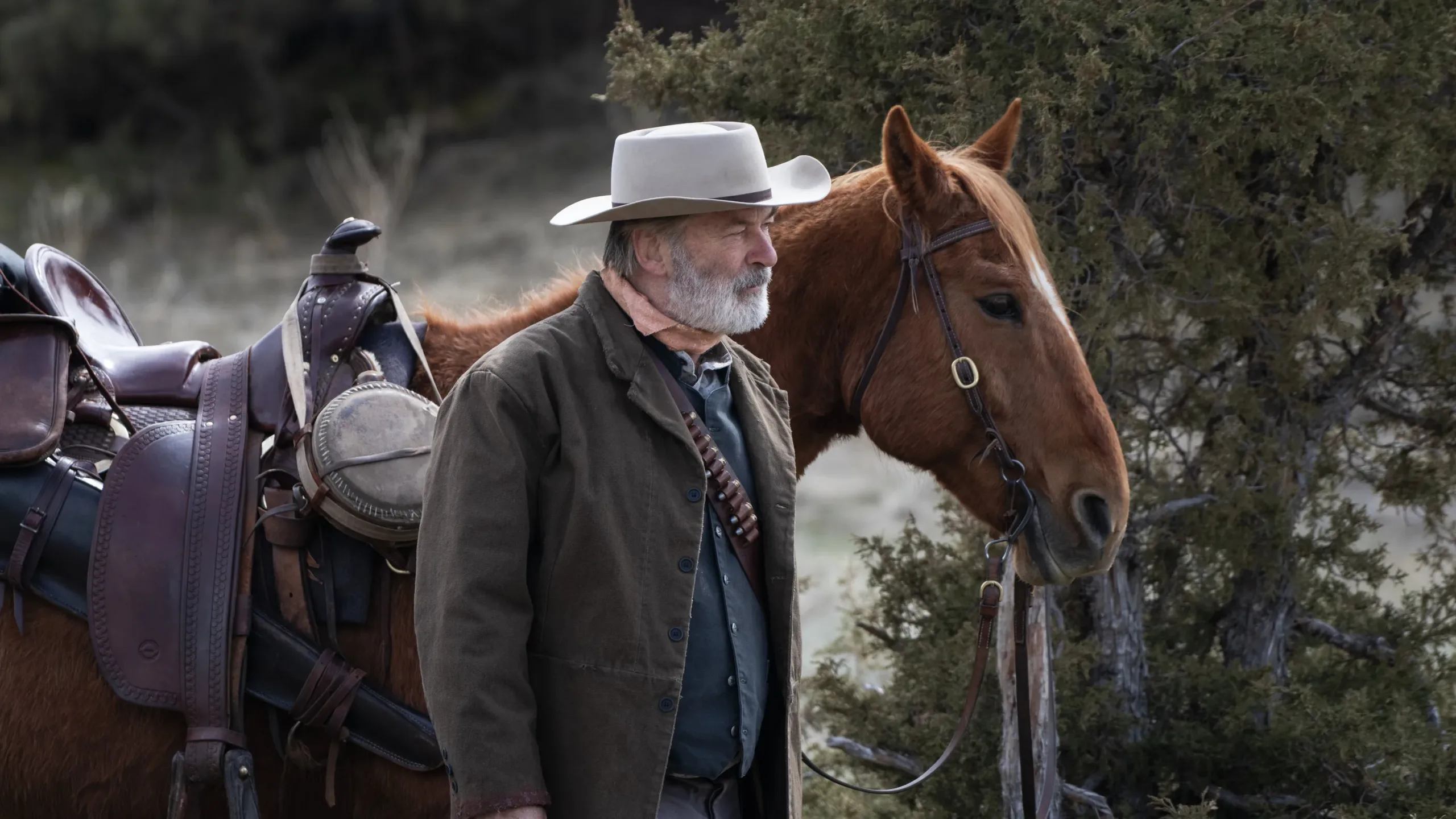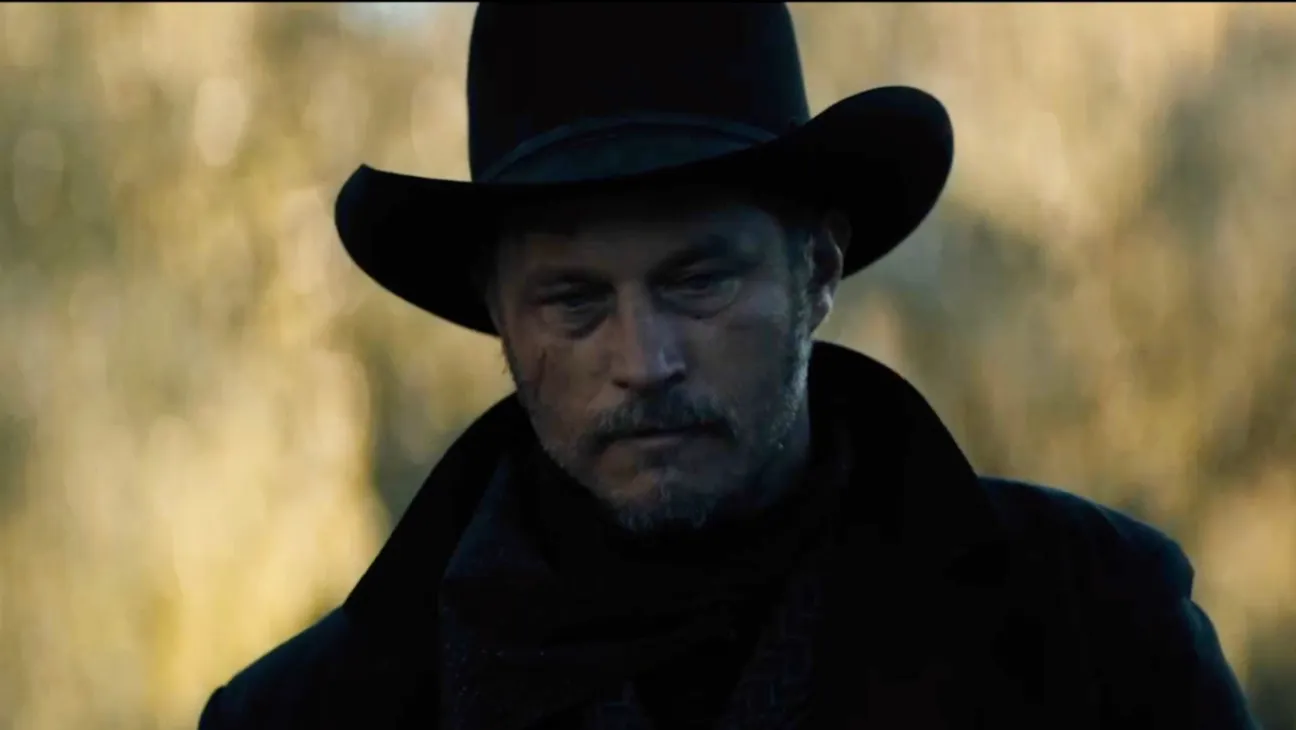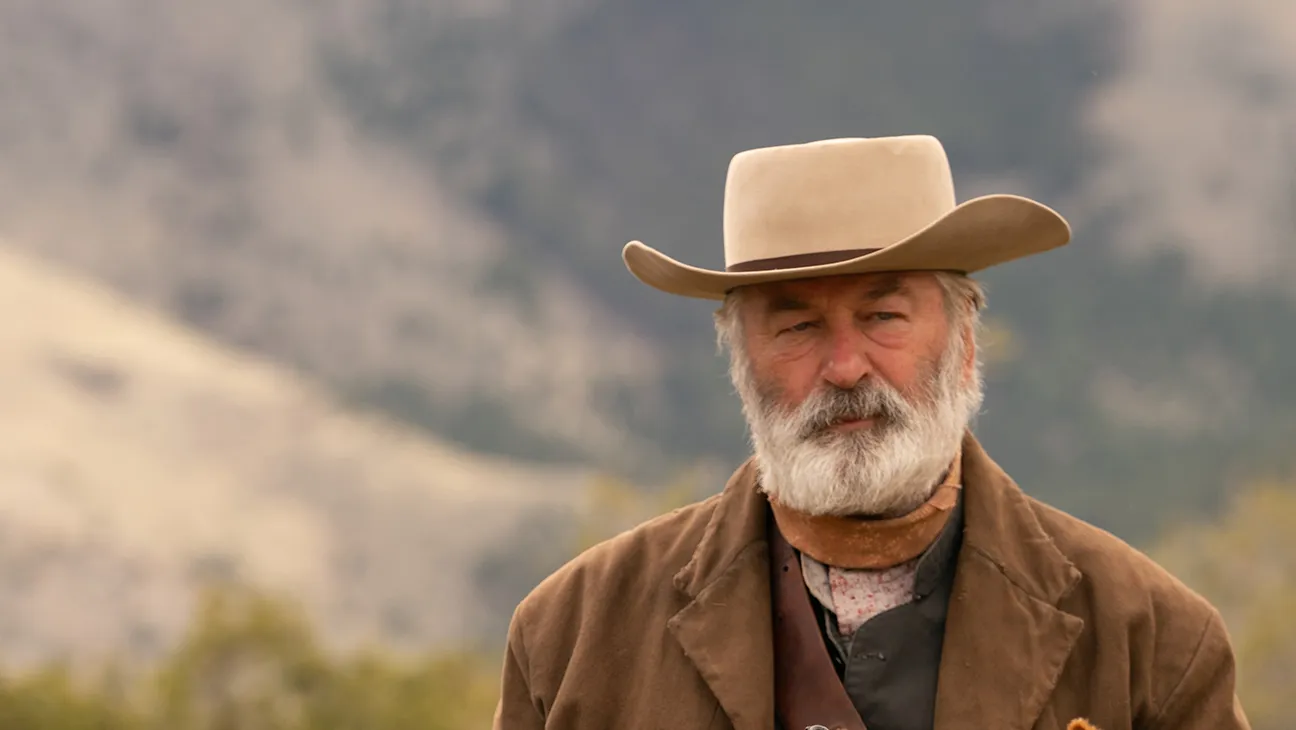In the dusty expanse of Wyoming Territory, 1882, life meant balancing scarcity and steel (and occasionally a misplaced bullet). Rust arrives as an indie art–Western that tiptoes between a grim morality tale and an unlikely buddy film—think True Grit with a generational twist.
Lucas Hollister, a 13-year-old orphan, accidentally kills a rancher while defending his little brother. The frontier court’s answer is swift: the gallows. Enter Harland Rust, a laconic gunslinger with more past sins than sermons, who busts his grandson out of jail and leads him toward the Mexican border.
That setup carries the weight of classical tragedy and a wry nod to our fascination with outlaw folklore. (Yes, we adore our antiheroes—provided they don’t accidentally shoot the cinematographer.)
Behind the camera, the film bears a solemn dedication to Halyna Hutchins, whose final frames linger like a silent elegy. Her dusk-and-sunset compositions haunt every scene, reminding us that art and loss often ride in tandem.
Here, the Western myth collides with modern guilt: can bloodshed ever be excused by kinship? Rust doesn’t hand out easy answers, but it does offer a brooding canvas where family bonds and frontier justice bleed into one another.
Echoes of a Fallen Frame
On October 21, 2021, a routine rehearsal at Bonanza Creek Ranch turned fatal. A prop gun disgorged a live round, killing Halyna Hutchins and wounding Joel Souza. (The irony of a safety measure becoming the fatal flaw feels almost Shakespearean.)
Production ground to a halt under a microscope of global outrage—questions about industry carelessness rose like smoke from a spent cartridge. Fourteen months later, cameras rolled again under Bianca Cline, tasked with matching Hutchins’ dying light. That pressure must have felt like walking a tightrope in a gale.
Legal reckoning followed. Alec Baldwin faced manslaughter charges but walked free; armorer Hannah Gutierrez-Reed was convicted. Justice, it seemed, bore the uneven weight of frontier scales.
To honor Hutchins, original producers waived all profits; her widower, Matthew, stepped in as executive overseer. The film closes with a dedication—“For Halyna”—followed by her own question: “What can we do to make this better?”. And there it sits, a cine-threnody, asking us to ponder art’s cost when human error and storytelling collide.
Anatomy of a Fugitive’s Odyssey
In Act I, we meet Lucas and his younger brother Jacob eking out an existence on a windswept Wyoming farm. Their parents gone, the boys inherit chores—and isolation. A scuffle in the general store (over a spilled sack of flour) bursts into violence, exposing frontier hierarchies where a father’s pride can be defended with an arm and a bullet.
Lucas, hunting a wolf to protect his flock, misfires and kills a passing rancher. The trial that follows treats a teenager as an adult offender: a hanging rope thrown over a wooden beam. This stark juxtaposition of childlike grief and draconian law evokes the Salem witch trials—mob justice ordained by procedure.
Act II opens in darkness. Rust arrives, spurs clinking like a heartbeat. His identity is shrouded (a sort of patriarch-o-deus). The jailbreak sequence is rendered in tight shots and held frames, the air thick with guilt and gunpowder. Escape. Against wide-open plains, they gallop southward—two outsiders in a land that views mercy as a currency in short supply. Their first brush with bounty hunters and lawmen is almost ritual: the hunter becomes the hunted. (Wisdom: don’t trust anyone who quotes scripture while cocking a pistol.)
Act III enacts the chase in episodic tableaux—inns where whispers trail your footsteps, river crossings that wash away footprints but not fears, homesteads that flicker like mirages. Marshal Wood Helm assembles a posse; Preacher Lang, with his zealot’s grin, offers salvation at a $1,000 price. Gunfire erupts in silhouette against a crimson sky—retribution writ large. Blood debt paid?
They reach the Mexican border and pause. Safety lies across a line on a map, yet emotional inertia lingers. Lucas has grown (reluctantly) into his violence; Rust, surprisingly, gleans a measure of redemption by teaching his grandson to survive. In that final beat—where hope and regret meet—their odyssey transcends its own violence, asking whether exile can become home.
Guns, Grief, and Gravitas
Alec Baldwin’s Harland “Rust” Rust embodies what one might call “grand-syndrome”—the potent mix of outlaw swagger and reluctant caregiver. He wears a white Stetson and a beard that could hide three secrets. His voice, unexpectedly light, rides awkwardly over 1880s idiom, like a smartphone dropped into a saloon.
Yet in moments of soft-spoken counsel to Lucas, he reveals a tenderness beneath the trigger finger. That tension between menace and mercy mirrors America’s conflicted memory of figures such as Wyatt Earp: celebrated vigilante, moral enforcer.
Patrick Scott McDermott’s Lucas Hollister feels born from a colonial court record—teenaged, grief-stricken, condemned. His stoicism masks a well of sorrow (and a powder keg of violent impulse). He shifts from scared boy to avenging fugitive almost imperceptibly, embodying modern debates over juvenile culpability. That evolution—call it his “rite-of-manhood arc”—raises questions about whether society’s harsh penalties ever fit a child’s broken psyche.
Across the plains trail two hunters. Josh Hopkins’s Marshal Wood Helm carries Lincoln-like gravitas and a paternal subplot that echoes postwar generals forced home to wounded families. His duty isn’t just law; it’s a personal reckoning with loss. Then there’s Travis Fimmel’s Fenton “Preacher” Lang, a Bible-quoting sociopath whose charm conceals fanaticism. He reminds us how ideology can sanctify brutality—no different from the tribalism of cold-war era death squads.
Smaller roles add flecks of color. Frances Fisher’s Miss Evelyn Bassett offers fragile sanctuary and conceals her own scars, symbolizing women’s often-unseen labor on the margins of history. The posse members—each a caricature stamped from dime novels—populate the landscape like ghosts of manifest destiny, their fleeting appearances underscoring how countless lives fueled westward expansion.
In Rust, these performances become more than acting. They’re lenses trained on justice, family, faith—and on an American mythos that still wrestles with its ghosts.
Frame, Frequency, and Frontier
The camera lingers on horizons that feel both eternal and entombed. Halyna Hutchins’ dusk-and-sunset compositions drape each scene in moody sensuality—shadows stretch like regrets (a tip of the hat to The Searchers’ mournful silhouettes).
When Bianca Cline steps in, her palette remains unwavering: deep blacks swallow half the screen, then spit out slivers of light that carve out characters’ faces. Wide vistas underscore the film’s picaresque breadth, while intimate close-ups reveal the grit behind Rust’s saddlebag eyes and Lucas’s silent tremor.
Silence, too, is a character. Lilie Bytheway-Hoy and James Jackson supply modernist cues—sparse piano motifs, woodwinds that whisper dread. These aren’t the loping harmonicas of classic Westerns but sonic shards of anxiety: they punctuate horse-chase crescendos like gunshots in an empty town square. Emotional beats arrive on sudden stabs of strings, as if reminding us that vulnerability can be more violent than a bullet.
The editing adopts what one might call “epochal pacing”—a deliberate alternation between leisurely way-stations and bursts of freight-train urgency. At 139 minutes, the film feels twice its length in ambition (occasionally it sags, true), yet its episodic structure mirrors the unpredictable tempo of real frontier life—one day’s calm can segue, without warning, into another’s carnage.
Every nail and buckle in the production design whispers authenticity. Dusty browns and weathered wood conjure an 1880s Wyoming that breathes hardship. Rust’s signature white Stetson and the ominous clank of his spurs become leitmotifs for his conflicted conscience—proof that even costume can carry symbolic freight.
Directing the Moral Frontier
Souza navigates intimate human moments and widescreen adrenaline with a kind of moral cartography—mapping Rust and Lucas’s fragile bond against sprawling plains (and equally vast questions of guilt). He shifts from hushed close-ups—where grief smells like gunpowder—to galloping chase sequences that echo our era’s relentless pursuit of justice.
Tone is a tightrope. Tragedy and tenderness coexist in uneasy tandem: a grandfather’s gentle counsel can segue, without warning, into a hail of bullets. This tonal fugue recalls post–Vietnam Westerns that wrestled with compassion and carnage on the same terrain.
The screenplay (co-written by Baldwin) brims with a galvanizing central premise: a boy condemned by a system allergic to clemency. Yet emotional undercurrents sometimes run shallow—an “emotional lacuna,” if you will—where scenes beg for interiority. Dialogue alternates between earnest frontier vernacular (“Ain’t no mercy out here”) and modern cadence (a reminder that history often speaks through contemporary mouths).
Pacing emerges as both asset and Achilles’ heel. Acts I and II unfold with deliberate patience: tension simmers, and the Rust-Lucas bond ripens like fruit on a hot wind.
Act III jolts forward—a hunt-and-escape freight train. Gunfights punctuate the rhythm, propelling us toward a crescendo of moral reckoning.
At 139 minutes, the film occasionally feels overburdened—each interlude charming but cumulatively sprawling. Yet there’s poetry in its measured gait: Rust respects the frontier’s unforgiving tempo, even when it tests the audience’s resolve.
Shadows and Legacies
The bond between Rust and Lucas ripples with inherited trauma—and unexpected grace. A gunslinger’s instincts passed down to a frightened boy (think Civil War ghosts whispering through a pistol’s hammer), this grandfather-grandson tie becomes both talisman and tormentor.
Frontier justice here is unflinching: a 13-year-old condemned to hang. The film holds up that verdict like a mirror to today’s debates over juvenile sentencing—when does protection become punishment? Meanwhile, the $1,000 bounty system turns human life into currency, evoking modern “prison-industrial” critiques where profit trumps mercy.
Death hovers in every frame. Hutchins’ real-world tragedy bleeds into on-screen carnage, making each gunshot feel like an echo from the grave. (Gaze long enough at a fallen body, and you start hearing absent voices.) This meta-layer of grief transforms violence into elegy—a principle I might call “cine-mourning.”
Nature isn’t a scenic backdrop but a stern referee. The wolf-hunt prologue throws Lucas into a crucible, reminding us that the wilderness tests character more brutally than any courtroom. Vast plains become stand-ins for loneliness, each horizon a question: Can one find solace when the world stretches on forever? As these themes intertwine, Rust becomes a ledger of moral debts—still unpaid.
Full Credits
Director: Joel Souza
Writers: Joel Souza (screenplay), Alec Baldwin (story)
Producers: Alec Baldwin, Matt DelPiano, Ryan Donnell Smith, Grant Hill, Anjul Nigam, Ryan Winterstern, Nathan Klingher, Melina Spadone
Executive Producers: Matthew Hutchins
Cast: Alec Baldwin, Patrick Scott McDermott, Josh Hopkins, Frances Fisher, Travis Fimmel, Jake Busey, Devon Werkheiser
Director of Photography (Cinematographer): Halyna Hutchins, Bianca Cline
Editor: David Andalman
Composers: James Jackson, Lilie Bytheway-Hoy
The Review
Rust
Rust stands as a haunting meditation on violence and kinship—its dusk-lit frames (Hutchins’s final gift) reverberate with grief even as Baldwin and McDermott forge unlikely bonds. While narrative lulls and underwritten emotional currents temper its impact, the film’s moral compass and stark imagery linger. A flawed but resonant Western.
PROS
- Stunning dusk-and-sunset cinematography
- Rich moral questions about justice and family
- Baldwin–McDermott chemistry anchors the story
- Authentic 1880s production design and costumes
- Tense, atmospheric jailbreak and chase sequences
CONS
- Pacing occasionally drags in midsection
- Emotional arcs feel underexplored
- 139-minute runtime can test patience
- Baldwin’s modern cadence sometimes jars
- Supporting roles lack full development









































